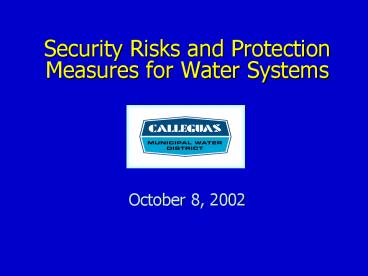Security Risks and Protection Measures for Water Systems PowerPoint PPT Presentation
1 / 18
Title: Security Risks and Protection Measures for Water Systems
1
Security Risks and Protection Measures for Water
Systems
- October 8, 2002
2
Agenda
- Protection measures taken by Calleguas
Metropolitan - General background on water system risks and
protection measures - Emergency response
3
What is being done by MWD?
- Aerial surveillance of the California Aqueduct
- All non-employees escorted at all times while on
District property - Access to all facilities severely restricted
- Guards on treatment plant gates
- Patrolling all branches and major pipelines and
aqueducts
4
What is being done by MWD?
- For the first few days after Sept. 11, chloramine
residual was raised from 2.5 mg/L to 2.8 mg/L - Reviewed and removed information from websites
regarding facility locations and other sensitive
material - All general interest tours have been cancelled
5
What is being done by Calleguas?
- Key parameters tied in to SCADA system which is
monitored by operators 24 hours per day - Intrusion alarms on hatches and entry doors
- On-line chloramine residual analyzers
- On-line pressure sensors
- Barbed wire fencing on all key facilities
- Mushroom style vents on new reservoirs
(conversion underway at older - reservoirs)
- No information on web site
- regarding facility locations
6
What is being done by Calleguas?
- All non-employees and delivery vehicles escorted
at all times while on District property - Tight security at Lake Bard facility (lake, pump
stations, and treatment plant) - Operators on site 24 hours per day
- Three employee residences at Lake Bard to provide
continuous security and surveillance - Locked gates with entry codes
- Key facilities are patrolled
- regularly by water quality
- and maintenance staff
7
What is being done by Calleguas?
- Employees instructed to report unusual or
suspicious activity - Increased coordination with outside agencies
- Established points of contact with FBI
- Coordinated with local police sheriff
departments to drive by key facilities and report
unusual or suspicious activity - Serve on Ventura County terrorist working group
and emergency operations team - Participate in notification systems from FBI,
California Office of Emegency Services, and MWD
8
General background on water system security
threats and protective measures
9
Water systems are not at high risk of
contamination
- Success of an attack on a large reservoir is
improbable due to the quantity of hazardous
material required (the solution to pollution is
dilution). Infectious doses for contaminants such
as cholera and typhoid are in the order of a
million organisms per 200 milliliter glass of
water. - The water treatment process protects against many
contaminants. - Disinfection residuals protect against many
contaminants. - The distributed nature of water systems makes it
difficult to contaminate a large geographic area. - Contaminants are more effectively delivered
through other methods.
10
What are the threats?
- Destruction of infrastructure causing inability
to deliver or treat water (pump stations,
reservoirs, electrical equipment, chlorine
cylinders) - Destruction of computer or SCADA systems
(considered by experts to be the most likely
threat) - Contamination of water supply (chemicals,
microbes, toxins, or radioactive compounds)
11
There are three levels of protection and response
- 1 Measures to prevent an incident from
occuring - 2 Measures to detect when an incident has taken
place - 3 Emergency response
- The goal is to never have to implement 3.
12
What are some protective measures which can be
implemented?
- Restrict access to manned facilities (gates with
entry codes, guards, badges) - Install chain link fences with barbed wire
- Secure hatches with locks
- Restrict access on tanks (stop ladders ten feet
above ground or install chain link gates on
steps) - Replace screens on tanks with mushroom vents
- Visit sites and look for weaknesses such as tree
branches hanging over fences - Maintain a disinfectant residual in the water
supply to protect against many contaminants - Limit availability of maps of water facilities
13
What detection systems can provide warning of a
breach in security?
- Pressure signals at remote facilities
- indicate destruction of infrastructure
- Intrusion alarms
- motion and/or heat sensors
- sensors to detect an open
- door or hatch
- traffic loops
Intrusion detector on hatch
14
What on-line analytical equipment can provide
warning of water quality contamination?
- Analyzers to identify organic compounds
- used on rivers in Europe to detect toxic spills
- requires complex lab instruments (such as gas
chromatographs) - VERY expensive and labor intensive
- must be set up for specific chemicals
- Microbial indicators to identify toxins
- bacteria, daphnia, shellfish, fish, mice
- expensive and labor intensive
- prone to false positive results
- Chlorine or chloramine, pH, and conductivity
- good indicators of most types of contamination
- low cost
- information on chlorine and chloramine residual
are valuable for other purposes
Chloramine analyzers
15
Emergency Response
16
What can utilities do to be prepared if facilties
are damaged or contaminated?
- Have redundant pipelines and pumps
- Install standby power supplies
- Maintain adequate storage in your distribution
system - Be prepared to activate any emergency
interconnections with other systems - Have your emergency contact list up to date
17
Calleguas contacts in the event of an emergency
- DHS District Engineer
- Purveyors/Customers
- County Environmental Health
- DHS Food and Drug Branch
- News Organizations (radio, television, print
media) if warranted - Law Enforcement (if warranted)
18
In the event of an emergency
- The County would activate the Emergency
Operations Team at the County Govenrment Center - Bruce Fischer will represent Calleguas at the
County EOC - The county would coordinate a joint response
- Federal and State resources would be made
available

